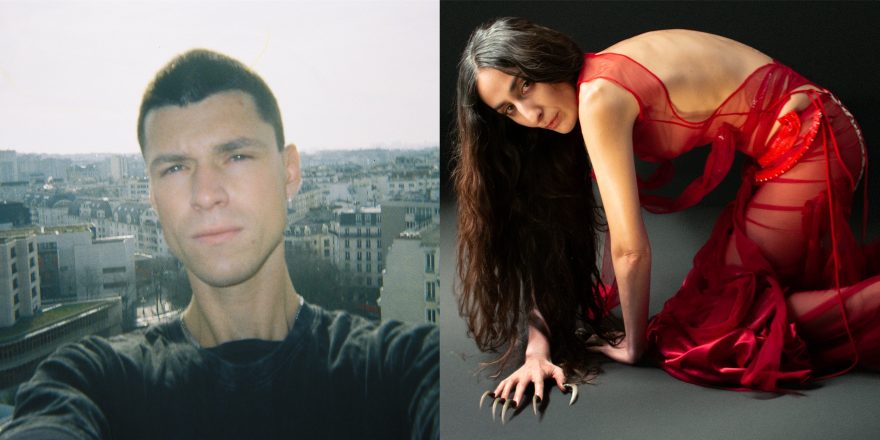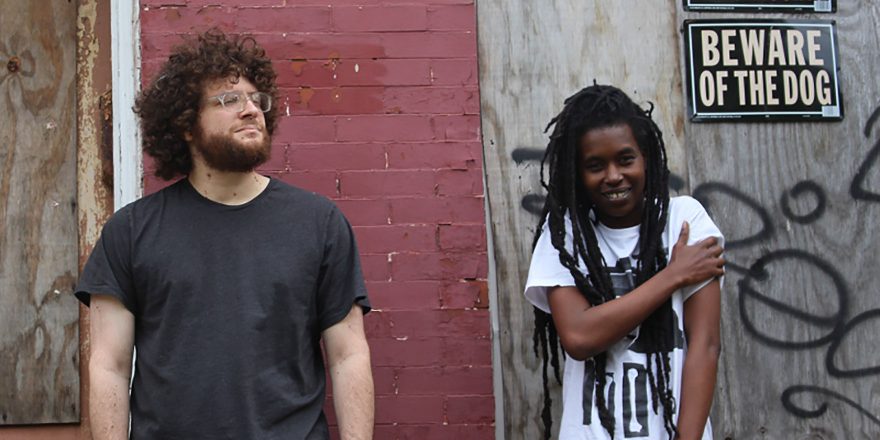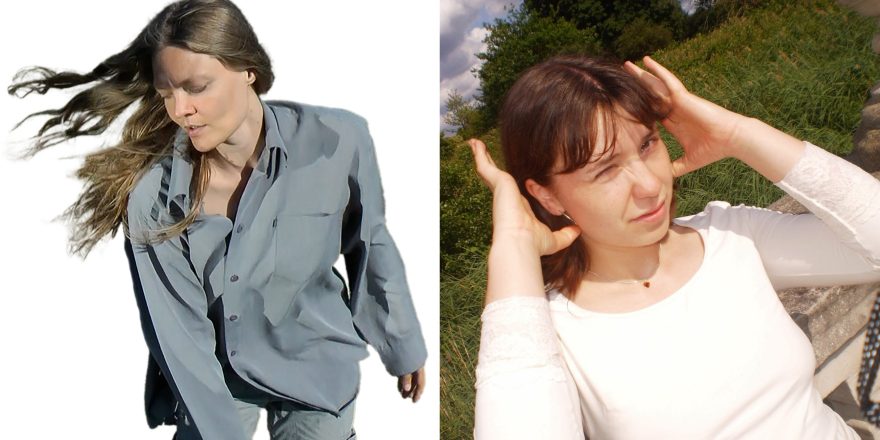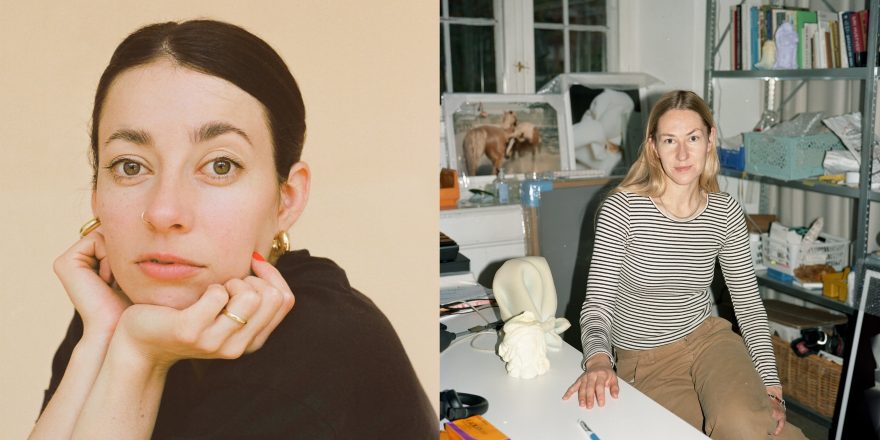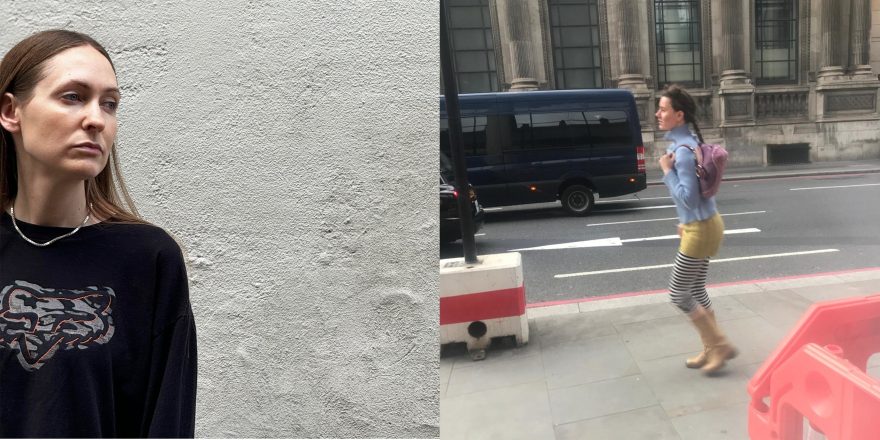Villads Klint is an electronic music composer based in Copenhagen who performs as Minais B; Francesca Burattelli is an Italian-Danish multidisciplinary artist also based in Copenhagen. The new Minais B record, And i know i can feel bad when i get in a bad mood, just came out last month (via Villads’s own label Anyines) and to celebrate the release, the two artists got together to catch up about it, and much more.
— Annie Fell, Editor-in-chief, Talkhouse Music
Villads Klint: This is recording number 433 on your phone, Francesca.
Francesca Burattelli: Yeah.
Villads: So what are you recording?
Francesca: [Laughs.] I have a lot of voice memos. I record if I get ideas for melodies, like if I’m walking to the metro and I think of a melody and I have to remember it.
Villads: I’m very new to the voice, but I started doing that recently — because you always hear that from people who write songs, you gotta catch it in the moment. But then every time I would try to listen, it would be like, [makes a crazy sound].
Francesca: [Laughs.] Unrecognizable.
Villads: You could not recognize the melody at all. Actually, some songs came out of it, but it wasn’t of much use. But it works for you.
Francesca: I mean, I’ve also had that, where you listen back and you have no idea what the melody was. But also, it depends on where you record it, because if I’m home with my computer I would just directly record it in a project. But it’s often when you’re outside, and then I’m too embarrassed to sing loud. So maybe that’s it.
I have a cute memory of this — when we were kids and lived in Italy, we had this cassette [player], and my older sister learned how to record cassettes on it. I remember my sister sneaked in to record her own voice, and I found the tape and listened back, and she was like, “I’m gonna record my voice because I really hate my voice, and now I’m gonna listen back, but it’s a bit embarrassing, but I just wanted to see how my voice is from the outside, so I’m gonna record it now.” She had done that secretly.
Villads: Wow.
Francesca: Yeah. I was so impressed. I found it — and if it would have been her, she would have teased me so much with it. But what I did was, the day after, I did the exact same thing. So I was sneaking in, and I didn’t know what to say, so I just said exactly the same thing. “I just happened to be here, and I think I’m gonna record my voice, I don’t really like it, but I just want to hear it from the outside.” And I think we still have that tape somewhere.
Villads: You should find it. You should use it for something. But it’s so funny because that’s the thing everybody has, how your voice sounds different to others and in recordings than it does to yourself. It sounds very honest to, as a child, already be like, “I don’t like my voice but I’m gonna record it to experience it.” But then how does that feel as a singer for you? Because you’ve chosen that your whole life is gonna be that. [Laughs.]
Francesca: Yeah, exactly. The funny thing is also that I was only 5 or 6 — I didn’t really get this thing like, “I don’t like my voice.” That was just something that my sister said, but I wasn’t even there yet. Because when you’re a kid, you don’t really think that much about how you look or how you sound. You don’t think about the view of others that much. So I remember being like, OK, so, if I record it, it’s gonna sound different. But I guess then choosing to work with the voice is just like one long travel of trying to not be self conscious. So when you actually try it in your teenage years, and your whole life is about being self conscious and feeling wrong, I guess it was like a subconscious way of exposing myself to not liking my voice. So then it’s like, I have to use it all the time and listen back to it all the time until one day maybe I’ll like it. [Laughs.]
Villads: Seriously. You have a background in visual arts. Did you always use your voice, from this distant moment of destiny as a kid ‘til now?
Francesca: Yeah. The reason why I went to art school was because I didn’t get into the conservatory. And I had some friends that studied art, and I did draw a lot when I was a kid, but I really wanted to do music. But then I was like, “OK, then I’m gonna try art school.” I’m really happy that I did, because I think my music has become much better from that. I feel like all my years at the academy was all one long way of trying to find an excuse to make music, but then make it very arty somehow. Because also, they didn’t really accept it at the art school — you were not allowed to do only music. I think it’s a bit different now, but back then they were really not happy about it. So you had to make it a performance, or have some clear conceptual thing with it.
Villads: Well, whatever it did, I like it. To me, you have this very unique way of using the voice in a lot of different ways that I really admire. It’s very interesting to listen to your work because you have this almost virtuosic way of using the voice as both a way of talking and a way of singing. And sometimes you also sing without words, just sounds, but it sounds like language. You also navigate between languages like between English and Italian.
Francesca: And sometimes Danish.
Villads: And sometimes Danish, let’s go! How did you come up with this? Because it’s very much your own.
Francesca: I’m quite sure that it comes from four years of disguising songs as sound art. Because it was both working a lot with text without compromise — or, if we generalize, we could say that somehow you have to compromise with language and text when you’re writing song lyrics. And now, I’m not talking about rap, but more like repetitive ways of singing—
Villads: Even though we are rap experts. [Laughs.]
Francesca: [Laughs.] But in that, you do get closer to maintaining a lot of the text. But classical ways of writing pop songs, you don’t have space for all the words that you might start with. It’s just a simpler, more boiled down language — which I guess is poetry. It’s this compromise between text and song. So it also came from, for a long time, not compromising. So just having a lot of text, and having to somehow fit it and not cut it down. And I guess from that, there was a lot of this weird talking, which is not really spoken word because it’s not speech. It’s not spoken word, it’s not rap, and it’s not song. It was just a middle thing that I tried to work with. But then at the same time, I tried to mix the other kinds of more singable language. But also, I did have some references. I did have Robert Ashley—
Villads: And Elvis!
Francesca: And Elvis. But, Robert Ashley — do you know him?
Villads: Yeah, of course. [Sings,] “Lonely lady, middle of the afternoon…”
Francesca: [Laughs.]
Villads: I know the hits only.
Francesca: We don’t have to go more into it, but I had all kinds of weird references. Laurie Anderson also worked differently with the voice.
Villads: For sure. But I also think that Robert Ashley and Laurie Anderson both have this way of working with speech that, I get that reference, but what I’m talking about is [you] kind of creating this mythical space. Which, if I should refer to someone, I think it would be like Diamanda Galás. It’s kind of like a chanting. There’s this using the voice not to make something understandable, but just to create this special space, which I find very inspiring and intriguing.
Francesca: Thank you. I guess it goes back to also just religious chanting, kind of.
Villads: The Catholic legacy.
Francesca: The Catholic mass sound.
Villads: Because you grew up in a Catholic family?
Francesca: I mean, not really…
Villads: But it’s just in the culture.
Francesca: Yeah. You cannot avoid it. Like, I went to [Catholic] school, but that was just because it was the best kindergarten and my aunt worked there. It’s everywhere. So, yeah, for sure that.
I guess I also like how it’s kind of a middle way so you get the attention as if you’re going to deliver language, but at the same time you dissolve a bit, so it’s not speech. You have this attitude towards it like, “Hey, people, listen to this.” But then the message is not really clear. It has the urgency of a speech, but then it’s still more like chanting. I had other references — it also made me think of Moor Mother. Her language is quite clear, but she also has this weird, archaic, kind of mystical, almost religious, intense…
Villads: Do you ever feel like when you perform, you lose yourself? Because I think I’ve heard of how Moor Mother has this practice of going into this almost ritualistic space of making the music, and then stepping out of it.
Francesca: Sometimes it does happen, more while composing. Also while writing, and sometimes when I perform, but it has to be good circumstances for it. But it can happen, and that’s the best thing ever. That’s where the magic happens. [Laughs.]
Why did you start using your voice? Did you always want to sing and use your voice?
Villads: It’s definitely like a childhood thing. It’s always been there on and off. I think there’s something interesting about, in this latest stage of life, tapping back into this very teenage, childhood thing. Because I definitely see in my early years of music being very much into these pop and R&B songs, and doing them myself, and then getting into instrumental music or noise or whatever. So I’ve tried to come back to it.
I think it has arrived when I had something to express from the heart. It’s just this whole cliche of singing about love and romance. Also singing about loss. I needed words for this kind of topic. I think it’s also a thing about growing up listening to love songs, so you already have this very core understanding of how to express that. [The urge to use my voice] has occurred every time I’ve had something to say about love.
Francesca: Do you feel like you couldn’t do it with instrumental music?
Villads: No, I think you can do it every way. But there is this very, for me, raw, naive, almost banal — but not in a negative way — energy for me to tap into. I feel like it’s a childhood, and also teenage, thing that’s been really nice for me to tap into. Also talking about lyrics — for me, singing is a new thing, but lyrics is a new new thing. I’ve noticed that I often write these very simple, straightforward [lyrics]; there’s no poetic vibe to it. It’s very teenage, and it’s very cliche love song. But I do think that there is this very interesting raw energy in those, “My hands are shaky and my knees are weak” words. And, of course, it’s a balance. I’m curious how to balance that out with something that’s more specific to my own world. But also, when other artists have these very clear, straightforward lyrics, it talks to me. And they’re often about love.
Francesca: Yeah. That’s a very funny interesting topic that I also keep going into — that the most dangerous thing you can do is to use that simple language to paraphrase or to create a distance to the feelings that you feel — kind of almost being ironic with these words. Which I really don’t think is the case with you. It’s actually going into the feelings. But sometimes you can hear in songs if people try to keep a distance from this. You want to say, “Come on, stick with it. Don’t say you’re ironic about it. You do want to sing ‘I love you, I love you!’” Irony is always a way of distancing yourself.
Villads: Irony is definitely a weird thing in music. I really enjoy when you can feel humor in music, and it’s something that sometimes I feel disconnected to in my own practice, but I strive for it. With this last thing, there’s not much humor. But it’s something that I think about, and I really appreciate it when people have humor in their music, and when you can feel that somebody’s been having fun while making their music. But I totally get what you’re saying with how irony can so quickly be a way to cover up something that you want to say in a very honest way, but you’re too afraid to say it. It’s this way of distancing yourself from the cliches of pop music and love songs.
But that’s funny because I think you don’t have that much irony in your music at all.
Francesca: No.
Villads: Your music is quite serious, actually.
Francesca: Sometimes I feel like it’s a bit too serious.
Villads: I don’t experience that. I know I just said that I appreciate funny music, but it’s definitely not for everyone. I also feel like you touch upon some subjects that, it’s not supposed to be funny, and the fun would kind of take something away from it. I also admire that, to really go into a place of hurt or sorrow or darkness.
Francesca: For me, especially with the new album, I reference a lot to these South Italian folk songs, and they are very dramatic. Especially these ones from Naples. I totally got into the figure of the dramatic singer — like, crying out for those who can’t, maybe because they are oppressed. So it’s these songs about poverty or emigrating and missing home. And, of course, love songs. But sometimes they’re also political songs disguised in love songs. There is this focus on pathos and drama that I really, really love, and it is serious. I’ve always loved this — I mean, I also was a very emo teenager. But I do really love also humor in music. It would be nice to try for myself to not make such serious music all the time.
Villads: I think it can be very serious and you can sense the fun at the same time. It’s about also the process, and if there’s fun in the process, you can also kind of feel it sometimes in the music.
Francesca: The lightness in the process… Now you’ve started playing concerts with vocals, which is a bit new for you.
Villads: Very new — I’ve only done it twice.
Francesca: Do you want to talk about it?
Villads: Well, the main thing is I feel that there is this way of being in contact with my body and my voice at the same time. I’m not a singer at all. I’m not trained. I’m also very afraid, so there’s a big fear that I’m dealing with about standing up and singing in front of people. But I’m trying to tap in to this way of losing myself a little bit, losing my consciousness about this moment in front of people and just trying to tap into the sound from the speakers, and the instruments if I’m playing with someone. And then I’ve noticed that it feels easier to sing. It feels better. You can rehearse so much in this very specific way of doing it, and “I’m going to play the piano like this while I’m singing.” But sometimes there’s this thing about just feeling the words. And again, trying not to be ironic about it, and being like, OK, now I’m singing this. Maybe I do not feel this way at all anymore, maybe I think this lyric is not the nicest lyric that I wrote, but I’m gonna try to tap into that emotion.
I’ve also thought a bit about this way of using the voice differently, inspired from you and other people, and one thing on this latest record that I tried to work with was ad-libs — like yells or reactions. I also try to do that live sometimes. It’s a balance again, but this way of expressing emotion through yells and calls and stuff that’s not singing a melody in tune. Because that’s also a way for me to tap into the energy of the song, and express emotion that takes up a lot of space.
Francesca: It’s weird — I guess some of this embarrassment can come from not really wanting to take too much space, or be the protagonist somehow. But at the same time, you do want to do that.
Villads: Obviously, if you’re up there.
Francesca: It’s a conflict about the role that you have. But at the same time, I try to remember that it’s, again, to get myself out of this ego wormhole kind of thing, and to be in it and take distance from myself as the performer. It’s for the music; it’s not about who I am and why I’m standing there somehow.
Villads: Yeah, it’s about channeling that energy of the song. That you, of course, wrote, but still…
Francesca: But now you’re serving it. You made it, but when you’re there, you have to serve the music somehow.
Villads: Totally. And I think it can be difficult, because of course you think about how you look, who’s in the audience, blah blah blah. But when you can let go of that and tap into the energy of the song — that’s when it’s a good show.



